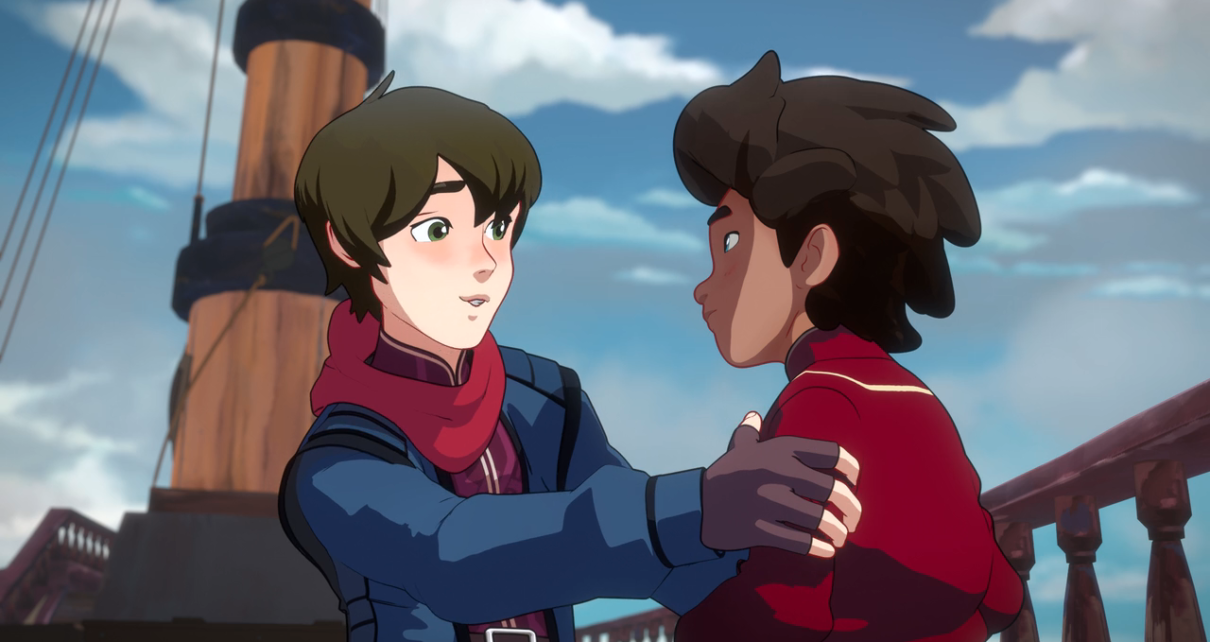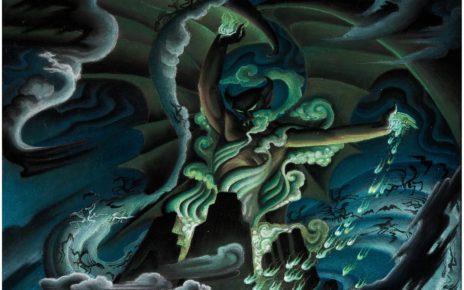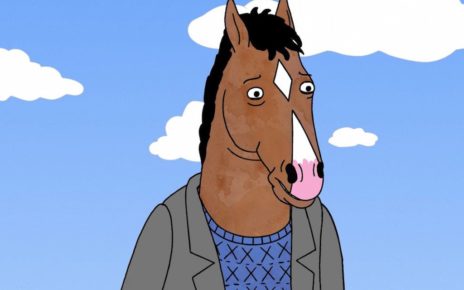Editor’s note: Spoilers for The Dragon Prince follow.
Unless you’re an only child, learning to be a good sibling is one of the hallmarks of growing up. With that knowledge, a number of fairly recent children’s and all ages cartoons have worked to portray sibling relationships with a remarkable poignance and elegance. Over the Garden Wall’s portrayal of being the eldest child has haunted me since I first saw it, and Avatar: The Last Airbender depicts varying sibling dynamics with a particular deftness.
It follows that The Dragon Prince, which was co-created by Avatar head writer Aaron Ehasz (with Uncharted series video game developer Justin Richmond), would be just as deft. And as in Avatar, the children of The Dragon Prince have complicated family lives. Two of its three primary protagonists, Callum and Ezran, are half-brothers. Callum’s father died before the events of the series, as did the boys’ mother, Queen Sarai; King Harrow of Katolis, Ezran’s father and Callum’s step-father, dies early in the show’s first season.
The boys’ childhood friends, Claudia and Soren, don’t have it much easier. Their parents are divorced, and they haven’t seen their mother, who effectively abandoned them, in years. Their father, Viren, the High Mage of Katolis and formerly the late Harrow’s closest adviser, is a man of dubious ethics and unbridled ambition, whose close relationship with his daughter does not stop him from sending both his children away from his side with orders to commit heinous crimes against their friends and their kingdom.
Other than having each other, these siblings are pretty much on their own—give or take a magical beast or two and a turncoat elf companion on the part of Callum and Ezran. And the two sets of siblings are separated from each other as, for the bulk of the first two seasons, their personal missions conflict. It’s within that context that each sibling is tested and force to make his and her own painful decisions and sacrifices that illustrate the complexities of growing up.
The Caretaker
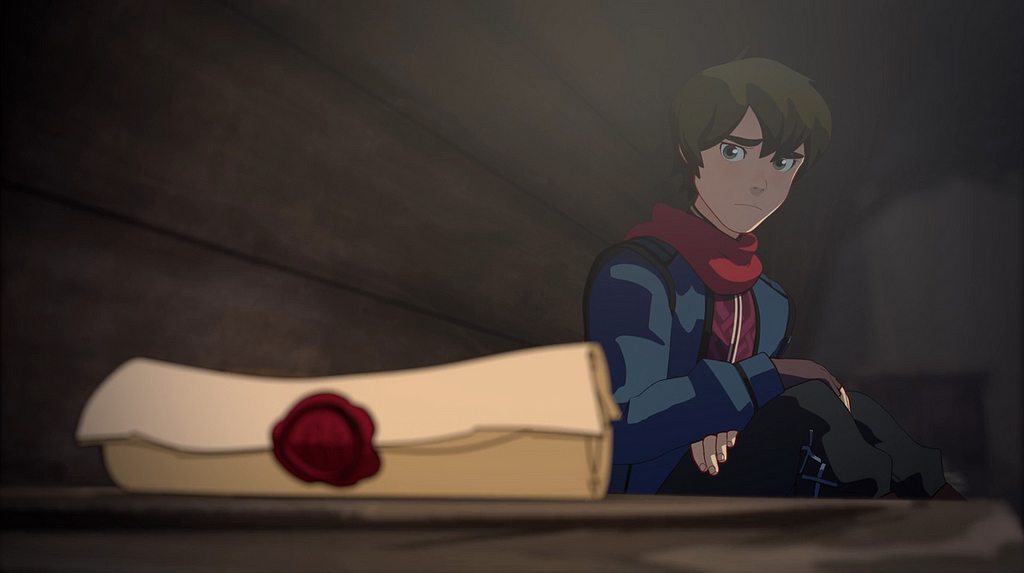
Callum, the elder brother to a boy with immense impending duties, is saddled with weighty responsibilities of his own. Charged by Harrow with taking care of his younger brother in loco parentis following the king’s death, Callum is asked to ensure Ezran’s safety as well as his growth, all while trying to grow up himself. He’s also charged with breaking the news to his brother that their father is dead, something Callum just can’t bring himself to do. More than that, he’s asked to be the primary counsel to an orphaned child king—and, in effect, to ensure the safety of a kingdom. And all this happens while Callum, who’s not quite a born leader, is the de facto head of a mission to put the end to a war between humankind and the magical creatures of the nearby enemy kingdom of Xadia by delivering the titular prince of the dragons back to his homeland.
Most real-world children don’t have nearly these kinds of concerns. But the hardships of being the elder—not quite caretaker, not quite wise enough to be a counselor, yet forced, by circumstance of birth, to be a bit of both—is all too real. Decisions older siblings make as children can affect their younger siblings for the rest of their lives. That knowledge, all too inescapable, makes the fear of, say, breaking the news of a father’s death feel insurmountably daunting. Compassion, which Callum has in spades, is a wonderful trait. But it isn’t everything when it comes to relating to people, let alone to taking care of a child while still one yourself. Callum’s struggle to learn the wisdom of experience while protecting his brother all the while is one many elder siblings—this one included—struggle with all their lives.
The Leader
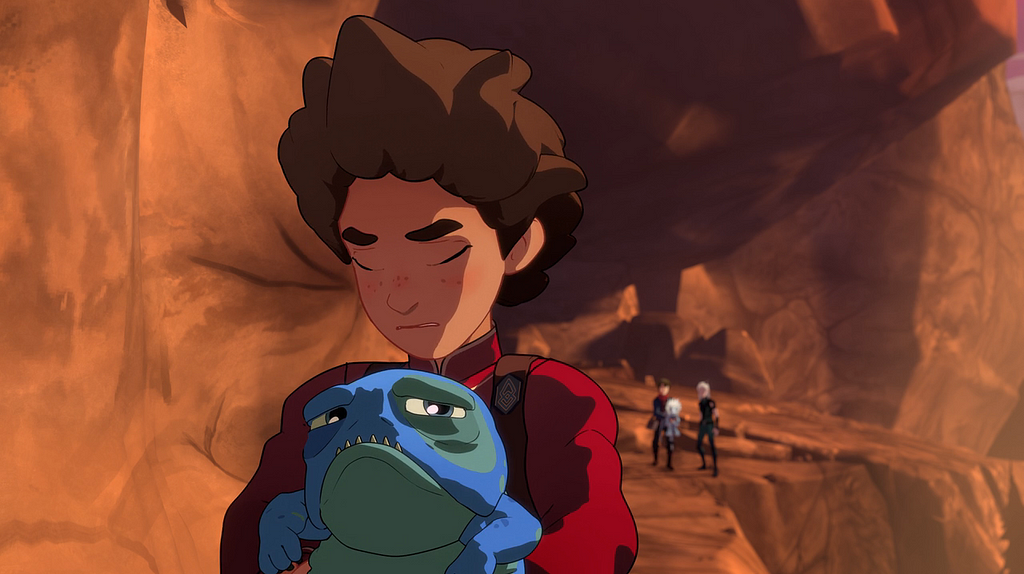
Imagine being ten years old and learning after the fact, almost by accident, that your only surviving parent has died. Then imagine realizing, instantaneously, that you are now responsible for the lives of hundreds of thousands, perhaps millions of people, despite not even having gone through puberty. By the end of the second season if The Dragon Prince, that’s precisely what happens to Ezran. It all happens while he’s on the same adventure as Callum. Suddenly, he realizes that he has to trust his brother, nearly the only family he has left in the world, to complete their mutual quest without him. He has no choice. He has a kingdom to rule.
In our world, too, children are orphaned far too often. And when they are, suddenly, they are alone in a way they never knew. Even when they still have family, that loneliness is crushing, and the realization that life must go on, and that society saddles you alone are with the ultimate responsibility for the manner in which your life does just that, is an immense burden. It’s a burden Ezran will only truly face down in the show’s next season, but by the end of season two, it’s one he knows he has to accept.
The Soldier

You, the oldest, are not the favorite child, having less in common with your father than your younger sister. Nevertheless, you love them both, and would do anything for them—just as you would do anything to prove your love and worth to your less-than-kindly father. Sometimes that means getting stellar grades, or holding down a job and doing it well. Sometimes it doing something you know is wrong to prove your loyalty—even if that means murdering your childhood friends, the children of your father’s former best friend and the heirs to your entire kingdom.
Soren’s challenge is to do what he’s told in order to prove himself to a distant parent and, consequently, to himself. He’s like the son of a self-involved former star high school school running back who spends countless hours playing sports to please his dad and being mean to the nerds in class to fit in, even though he’d much rather be in band or the school musicals. And he has to do it while loving and supporting his sister, the favored child, without allowing resentment of his station to affect their relationship. He’s a vehicle, too, for the show to explore toxic masculinity. Soren’s seeming arrogance and reckless willingness to do anything in pursuit of a goal he doesn’t even want is a mask for self-doubt and lack of purpose — struggles the average teenager knows all too well.
The Healer
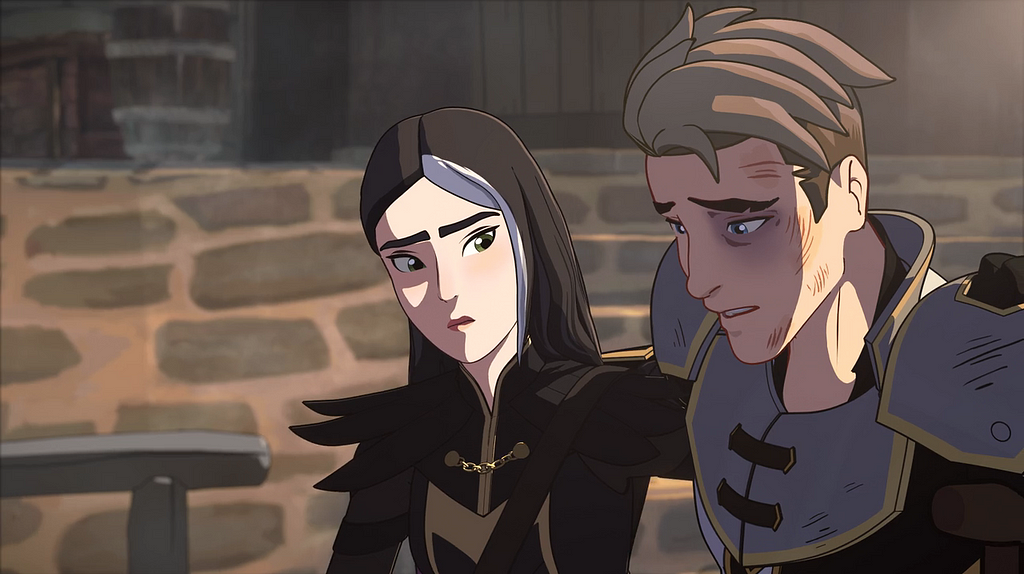
There comes a moment, in the lives of many children, where a sudden tragedy makes them feel utterly powerless. Sometimes it’s the death of a loved one, or the unexpected loss of a family’s entire income. At those moments, it’s hard not to feel the desire to do anything, no matter how wrong or painful, just to try to make a difference. Especially if that tragedy is something that hurts someone you love.
Claudia has other troubles, too. Trying to live up to her father’s expectations for her provides an immense amount of pressure. But at the moment her brother Soren is paralyzed from the neck down, seemingly for good, while fighting a dragon by her side, it becomes a dominating force in her life. She was there, she saw it, and she couldn’t protect him. Survivor’s guilt is devastating at any age, but as a child, it’s on a whole other level. The impulse, always, is to blame yourself, even when it’s not your fault. And, of course, to do try to do anything to make things normal—even if that means murdering a fawn and using its life energy to make your brother walk again, at the expense of a part of of your own soul.
Cartoons frequently traffick in the impossible. In art, anything is possible, so why not throw in some blood magic and dragonfire? But forming the backbone of almost all art is humanity. In fiction’s case, that often means the relation of the fictional to the all too real—and in children’s fiction, those corollaries are strongest when they touch on the particular emotions and challenges of childhood. In depicting sibling relationships, The Dragon Prince does just that, with nuance and honesty. And, of course, with dragons. Because why not?
Thanks for reading The Dot and Line, where we talk about animation of all kinds. Don’t forget to follow us on Twitter and sign up for our newsletter.


